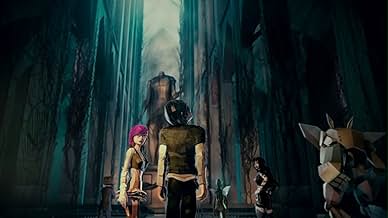VALUTAZIONE IMDb
6,6/10
12.164
LA TUA VALUTAZIONE
Dopo aver subito un'estrema umiliazione a scuola, Dominik si rintana nella sua stanza e inizia a passare tutto il suo tempo in una chat room di realtà virtuale.Dopo aver subito un'estrema umiliazione a scuola, Dominik si rintana nella sua stanza e inizia a passare tutto il suo tempo in una chat room di realtà virtuale.Dopo aver subito un'estrema umiliazione a scuola, Dominik si rintana nella sua stanza e inizia a passare tutto il suo tempo in una chat room di realtà virtuale.
- Regia
- Sceneggiatura
- Star
- Premi
- 25 vittorie e 11 candidature totali
Roma Gasiorowska
- Sylwia
- (as Roma Gasiorowska-Zurawska)
- …
Ewelina Paszke
- Zona ministra
- (as Ewelina Paszke-Lowitzsch)
Recensioni in evidenza
Dominik has it all: a wealthy family, good looks, intelligence and a bright and promising future ahead of him. But why does he feel like he's losing his grip on all of it? Popularity seems to elude him, and although a few girls still want to dance with him in parties, he's slowly succumbing to shyness, struggling against minor aggressions from other students, against the seemingly harmless mockery of his peers.
Adolescence is always difficult, hormonal changes and new feelings can destabilize anyone. Dominik finds himself exscinded, adrift between two possibilities: What does it mean to be manly? And what does it entail to act effeminately? Gender roles are not unwavering, as they change and evolve through times, through the actions of the people. Gendered behaviors are unnatural: the way in which we learn the performance of gender roles (what we commonly associate with femininity and masculinity) is an act of sorts, a performance, one that is imposed upon us by normative heterosexuality. We are like actors in a stage, trying to persuade others that we are either men or women: we do not follow our natural tendencies but rather the dictates of society.
Everything in Dominik's life pertains to the norm; even his parents are ruled by it: they are like slaves following the orders of the marketing industry, in the case of the mother, and the government, in the case of the father. Yes, they have made a fortune, but in order to do so they have obeyed norms for so long that they can no longer feel free. It's this slavery that forces them to assume the heterosexual normativity to the extreme and have sex with anonymous lovers. They need a member of the opposite sex to enforce their roles as productive and successful heterosexual individuals.
And that's what's expected of their son. And that's why he cannot reconcile his existential doubts with the demands of adulthood. In her book about Performativity, theorist Judith Butler asks herself to what extent our acts are determined for us, rather by our place within language and convention. For Butler, identity is an illusion retroactively created by our performances. She defines identity as "a compelling illusion, an object of belief" (not unlike Dominik's interpretation of Hamlet). Perhaps in past decades this was harder to understand, but now let's think about the internet and online communities in which we can recreate and reinvent ourselves. That's what Dominik finds in the "Suicide Room", a virtual environment, a rendezvous point for a group of strangers that rely on 'avatars' and online interaction.
Although slightly insecure, Dominik is first presented as a 'normal' boy. Nevertheless, everything changes after a party in which two girls kiss each other and then challenge him to do the same with his friend Aleksander. The girls are not lesbians but they are subverting the foundations of heterosexual normativity. In the same way, the two boys kiss each other and personify for a few seconds the abject, id est, the homosexual condition. In order to have a heterosexual normativity there must be something that opposes to it.
At the beginning, it would seem like this innocent kiss doesn't disturb anyone. Dominik's friends upload the kiss on YouTube but there are no hard reactions, no negative consequences. It's like a simple, childish joke. That is, until Dominik is wrestling with Aleksander during their judo lessons. Aleksander holds him down, and rubs his body against Dominik, this becomes so arousing for the teenager that he can't help but to ejaculate right there. Aleksander starts laughing about it and Dominik leaves the room instantly, completely humiliated and embarrassed.
Aleksander, maliciously, tells everyone about the "semen incident" on Facebook, and the entire school starts laughing at Dominik. The boy is now under a lot of pressure and he cannot cope with it. That's when he finds a safe haven in the "Suicide Room". Let's remember that gender is completely a social construction, a fiction, and therefore open to change and contestation. In a way, this suicidal group is defying every convention; not only are they attempting to end their lives, but they are also computer generated images that have created an entire world online. This idea of identity as free-floating, as not attached to an 'essence', but instead to a performance, is part of the queer theory. And it's also fundamental in order to comprehend Jan Komasa's remarkable film. In the "Suicide Room" there is a Queen and warriors, and soon Dominik becomes a member of this club. Everyone here has, indeed, a floating, virtual identity. And gender rules don't really apply, as the Queen and Dominik have an intense friendship that can never turn into physical love.
Just as it happened in the opening frames of the film, there are two parallel sequences: the ones in the real world, and the ones in this non-existent place created thanks to the internet. When Dominik tells his parents that he might be gay, they adamantly refuse to give credit to such possibility. As it has been established, they're so deeply embroiled in the heterosexual normativity that no other alternative can be valid for them. By illustrating the artificial, conventional, and historical nature of gender construction, Butler critiques the assumptions of normative heterosexuality: those punitive rules (social, familial, and legal) that force us to conform to hegemonic, heterosexual standards for identity.
Unable to ascribe to predetermined gender roles, Dominik is now a tortured and fragile soul, vulnerable to the influence of this mysterious girl that acts like the Queen of the Suicide Room. But she along with her subjects are no more than phantasmatic projections devoid of any 'realness' or any sexual attributes for that matter. None of this matters to Dominik, who becomes more and more invested in this virtual world, neglecting reality and becoming completely isolated. A true masterpiece from Poland.
Adolescence is always difficult, hormonal changes and new feelings can destabilize anyone. Dominik finds himself exscinded, adrift between two possibilities: What does it mean to be manly? And what does it entail to act effeminately? Gender roles are not unwavering, as they change and evolve through times, through the actions of the people. Gendered behaviors are unnatural: the way in which we learn the performance of gender roles (what we commonly associate with femininity and masculinity) is an act of sorts, a performance, one that is imposed upon us by normative heterosexuality. We are like actors in a stage, trying to persuade others that we are either men or women: we do not follow our natural tendencies but rather the dictates of society.
Everything in Dominik's life pertains to the norm; even his parents are ruled by it: they are like slaves following the orders of the marketing industry, in the case of the mother, and the government, in the case of the father. Yes, they have made a fortune, but in order to do so they have obeyed norms for so long that they can no longer feel free. It's this slavery that forces them to assume the heterosexual normativity to the extreme and have sex with anonymous lovers. They need a member of the opposite sex to enforce their roles as productive and successful heterosexual individuals.
And that's what's expected of their son. And that's why he cannot reconcile his existential doubts with the demands of adulthood. In her book about Performativity, theorist Judith Butler asks herself to what extent our acts are determined for us, rather by our place within language and convention. For Butler, identity is an illusion retroactively created by our performances. She defines identity as "a compelling illusion, an object of belief" (not unlike Dominik's interpretation of Hamlet). Perhaps in past decades this was harder to understand, but now let's think about the internet and online communities in which we can recreate and reinvent ourselves. That's what Dominik finds in the "Suicide Room", a virtual environment, a rendezvous point for a group of strangers that rely on 'avatars' and online interaction.
Although slightly insecure, Dominik is first presented as a 'normal' boy. Nevertheless, everything changes after a party in which two girls kiss each other and then challenge him to do the same with his friend Aleksander. The girls are not lesbians but they are subverting the foundations of heterosexual normativity. In the same way, the two boys kiss each other and personify for a few seconds the abject, id est, the homosexual condition. In order to have a heterosexual normativity there must be something that opposes to it.
At the beginning, it would seem like this innocent kiss doesn't disturb anyone. Dominik's friends upload the kiss on YouTube but there are no hard reactions, no negative consequences. It's like a simple, childish joke. That is, until Dominik is wrestling with Aleksander during their judo lessons. Aleksander holds him down, and rubs his body against Dominik, this becomes so arousing for the teenager that he can't help but to ejaculate right there. Aleksander starts laughing about it and Dominik leaves the room instantly, completely humiliated and embarrassed.
Aleksander, maliciously, tells everyone about the "semen incident" on Facebook, and the entire school starts laughing at Dominik. The boy is now under a lot of pressure and he cannot cope with it. That's when he finds a safe haven in the "Suicide Room". Let's remember that gender is completely a social construction, a fiction, and therefore open to change and contestation. In a way, this suicidal group is defying every convention; not only are they attempting to end their lives, but they are also computer generated images that have created an entire world online. This idea of identity as free-floating, as not attached to an 'essence', but instead to a performance, is part of the queer theory. And it's also fundamental in order to comprehend Jan Komasa's remarkable film. In the "Suicide Room" there is a Queen and warriors, and soon Dominik becomes a member of this club. Everyone here has, indeed, a floating, virtual identity. And gender rules don't really apply, as the Queen and Dominik have an intense friendship that can never turn into physical love.
Just as it happened in the opening frames of the film, there are two parallel sequences: the ones in the real world, and the ones in this non-existent place created thanks to the internet. When Dominik tells his parents that he might be gay, they adamantly refuse to give credit to such possibility. As it has been established, they're so deeply embroiled in the heterosexual normativity that no other alternative can be valid for them. By illustrating the artificial, conventional, and historical nature of gender construction, Butler critiques the assumptions of normative heterosexuality: those punitive rules (social, familial, and legal) that force us to conform to hegemonic, heterosexual standards for identity.
Unable to ascribe to predetermined gender roles, Dominik is now a tortured and fragile soul, vulnerable to the influence of this mysterious girl that acts like the Queen of the Suicide Room. But she along with her subjects are no more than phantasmatic projections devoid of any 'realness' or any sexual attributes for that matter. None of this matters to Dominik, who becomes more and more invested in this virtual world, neglecting reality and becoming completely isolated. A true masterpiece from Poland.
Ohhhh my glorious king Dominik Santorski
I gotta say, I'm head over heels for Dominik. I mean, who wouldn't fall for a guy who can rock a hoodie and headphones like he's in a fashion show? He's got that brooding, mysterious vibe down to a science, and his virtual world adventures? It's like he's living in the ultimate video game. Plus, anyone who can emote so intensely through a screen has my heart. He's the perfect mix of emo and genius-like a moody Einstein. And let's not forget his artistic soul, which is just the cherry on top. He's like a digital knight, battling trolls and collecting emotional baggage. Seriously, his resilience and ability to make existential angst look good are just impressive. Who doesn't love a guy who can turn brooding into an art form?
I admit having read about the movie prior to watching it, and which brings me to say that the Wikipedia article of it is inaccurate. A low budget movie, but undeniably a good one; I feel that it hasn't been a story dramatic enough, while paradoxically I think that, much have been subtly underlie-d, which may either make it a movie about a guy who who couldn't take it, or about a guy, who is like many of us, or at least shares intrinsic aspects of ourselves, and who couldn't take it despite that he wanted to. A very fine actor, I was nearly convinced that I was watching something/one real, something/one that is actually happening/actually lived and died - it/he had me engrossed. Uhm. 4.8/5
This is a story that depicts loneliness and darkness and directed by Jan Komasa. Domink is a high school student who is only an son and was brought up in a wealthy family. Although he hides his wonder as to whether he might be a gay, he is an ordinary high school student, keeping in touch with friends on Facebook, laughing at a shocking video with them, and doing well with his life until his senior prom before graduation. His parents, always busy with their jobs, have created a barrier called isolation to keep him away. Dominik still manages himself in everyday life, but jokingly kissing Aleksander at a party unfolds Dominik's secret sense of homosexuality. Meanwhile, the kiss with the two boys is uploaded and hits a public relations on the net instantly. Whilst Domink enjoys the tension from the video and the comments at first, he becomes the laughingstock and his affection towards Aleksander ends up as a sense of betrayal. This causes him to become an outcast. Then, Dominik is invited into the chat room of virtual world called "Suicide Room" by a girl who can't find any hope in the real world. Whilst talking with the girl in the virtual world, he starts withdrawing from the real world, being attracted by her negative and mysterious allurement.
The story is well-conceived, expressing the changes of Dominik's psychological state: ordinary adolescence, close-mindedness, withdrawal, mental confusion, symptom of depression, etc. There is a distance in the worlds between the world where his parents and the psychologist live, and the world where Dominik lives. There is also his psychological condition where the diremption is making everything in his everyday life shut away from the real world, and his mental state that makes him attempt suicide. This makes the audience feel as if it is letting them walk through an endless, dark tunnel that has no exit. The net may make you feel platonic and eternity in a sense. Once you go out, you will see many people out there. Even though people may feel like they are connecting with each other through SNS, they may also feel isolated as if they are a grain of sand in the desert. This film well-depicted such distortion created in the net within the modern society. The ending is negative, leaving every question unanswered to the audience. The theme of the story, a person falls into a virtual world since he/she doesn't fit in anywhere, which may be a possible story. However, this will ring the heavy bell of your heart.
The story is well-conceived, expressing the changes of Dominik's psychological state: ordinary adolescence, close-mindedness, withdrawal, mental confusion, symptom of depression, etc. There is a distance in the worlds between the world where his parents and the psychologist live, and the world where Dominik lives. There is also his psychological condition where the diremption is making everything in his everyday life shut away from the real world, and his mental state that makes him attempt suicide. This makes the audience feel as if it is letting them walk through an endless, dark tunnel that has no exit. The net may make you feel platonic and eternity in a sense. Once you go out, you will see many people out there. Even though people may feel like they are connecting with each other through SNS, they may also feel isolated as if they are a grain of sand in the desert. This film well-depicted such distortion created in the net within the modern society. The ending is negative, leaving every question unanswered to the audience. The theme of the story, a person falls into a virtual world since he/she doesn't fit in anywhere, which may be a possible story. However, this will ring the heavy bell of your heart.
To be honest, I hesitated to go to the cinema because I was afraid that it's just another overrated (by media only) Polish film. However, I am very glad to announce that this film is REALLY worth being seen! Apart from an amazing performance of Jakub Gierszał and Agata Kulesza, you can admire excellent special effects together with well-written dialogs. Even though the idea of animation which is presented in the film may put somebody off, it should be pointed out that it actually fits perfectly well into the picture. 'Sala samobójców' shows the rules which are brought to life in modern world and leaves it to the audience to decide whether we should apply them in our own lives. I would recommend this film to everybody who is mature enough to appreciate its beauty and depth. For me, it was a real treat. Enjoy!
Lo sapevi?
- QuizUpon its release in cinemas in Poland, it was the number one movie for three weeks.
- Curiosità sui creditiOn the US DVD: "If you or a young person you care about needs support, call The Trevor Lifeline at 866-488-7386. It's free, confidential and available 24/7 Learn more at TheTrevorProject.org."
- ConnessioniFeatures F.E.A.R. 2: Project Origin (2009)
- Colonne sonoreDer Doppelgenger
composer: Franz Schubert, lyrics" Heinrich Heine
Score: Virtual Sheet music Inc.
Performers: Szymon Komasa (voc), Magdalena Zuk (piano)
I più visti
Accedi per valutare e creare un elenco di titoli salvati per ottenere consigli personalizzati
- How long is Suicide Room?Powered by Alexa
Dettagli
- Data di uscita
- Paese di origine
- Siti ufficiali
- Lingue
- Celebre anche come
- Suicide Room
- Luoghi delle riprese
- Aziende produttrici
- Vedi altri crediti dell’azienda su IMDbPro
Botteghino
- Budget
- 6.000.000 PLN (previsto)
- Lordo in tutto il mondo
- 4.878.284 USD
- Tempo di esecuzione1 ora 56 minuti
- Colore
- Mix di suoni
- Proporzioni
- 1.85 : 1
Contribuisci a questa pagina
Suggerisci una modifica o aggiungi i contenuti mancanti



































